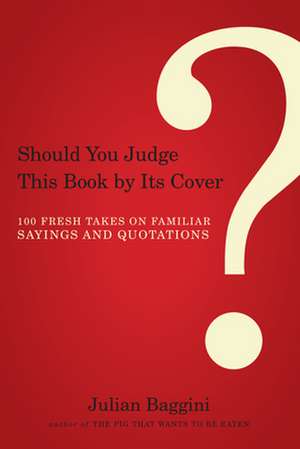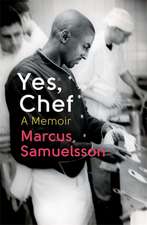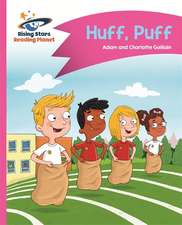Should You Judge This Book by Its Cover?: 100 Fresh Takes on Familiar Sayings and Quotations
Autor Julian Bagginien Limba Engleză Paperback – 30 apr 2010
| Toate formatele și edițiile | Preț | Express |
|---|---|---|
| Paperback (2) | 63.66 lei 3-5 săpt. | +9.64 lei 5-11 zile |
| GRANTA BOOKS – 4 mar 2010 | 63.66 lei 3-5 săpt. | +9.64 lei 5-11 zile |
| Counterpoint Press – 30 apr 2010 | 98.12 lei 3-5 săpt. |
Preț: 98.12 lei
Nou
Puncte Express: 147
Preț estimativ în valută:
18.78€ • 19.53$ • 15.50£
18.78€ • 19.53$ • 15.50£
Carte disponibilă
Livrare economică 24 martie-07 aprilie
Preluare comenzi: 021 569.72.76
Specificații
ISBN-13: 9781582436043
ISBN-10: 1582436045
Pagini: 223
Dimensiuni: 137 x 206 x 18 mm
Greutate: 0.27 kg
Editura: Counterpoint Press
ISBN-10: 1582436045
Pagini: 223
Dimensiuni: 137 x 206 x 18 mm
Greutate: 0.27 kg
Editura: Counterpoint Press
Recenzii
Praise for The Pig That Wants to Be Eaten
“Hugely entertaining.” —Publishers Weekly
“Thinking again is what this taut, incisive, bullet-hard book is dedicated to promoting.” —The Sunday Times (London)
“This book is like the Sudoku of moral philosophy: apply your mind to any of its ‘thought experiments’ while stuck on the Tube, and quickly be transported out of rush-hour hell.” —New Statesman (U.K.)
Praise for The Duck That Won the Lottery
“A curiosity cabinet of spurious reasoning and spin . . . Every society needs its guardian of good sense: Baggini is ours.” —Financial Times
Praise for What’s It All About?
“Useful and provocative.” —The Wall Street Journal
“Looking for a clear guide to what contemporary philosophy has to say about the meaning of life? Baggini takes us through all the plausible answers, weaving together Kierkegaard, John Stuart Mill, Monty Python, and Funkadelic in an entertaining but always carefully reasoned discussion.” —Peter Singer, author of How Are We To Live
“A work of popular philosophy that is simple, serious and devoid of ostentation. The question of the meaning of life has long been a byword for pretentious rambling. It takes some nerve to tackle it in a brisk and no-nonsense fashion.” —New Statesman (U.K.)
“Informative, thought-provoking, and entertaining in the process. The book takes a refreshingly personal approach and offers an encounter with a vigorous mind at work, puzzling through the issues in a trenchantly argued but subtly reasoned way.” —New Humanist
“Hugely entertaining.” —Publishers Weekly
“Thinking again is what this taut, incisive, bullet-hard book is dedicated to promoting.” —The Sunday Times (London)
“This book is like the Sudoku of moral philosophy: apply your mind to any of its ‘thought experiments’ while stuck on the Tube, and quickly be transported out of rush-hour hell.” —New Statesman (U.K.)
Praise for The Duck That Won the Lottery
“A curiosity cabinet of spurious reasoning and spin . . . Every society needs its guardian of good sense: Baggini is ours.” —Financial Times
Praise for What’s It All About?
“Useful and provocative.” —The Wall Street Journal
“Looking for a clear guide to what contemporary philosophy has to say about the meaning of life? Baggini takes us through all the plausible answers, weaving together Kierkegaard, John Stuart Mill, Monty Python, and Funkadelic in an entertaining but always carefully reasoned discussion.” —Peter Singer, author of How Are We To Live
“A work of popular philosophy that is simple, serious and devoid of ostentation. The question of the meaning of life has long been a byword for pretentious rambling. It takes some nerve to tackle it in a brisk and no-nonsense fashion.” —New Statesman (U.K.)
“Informative, thought-provoking, and entertaining in the process. The book takes a refreshingly personal approach and offers an encounter with a vigorous mind at work, puzzling through the issues in a trenchantly argued but subtly reasoned way.” —New Humanist
Praise for "The Pig That Wants to Be Eaten""Hugely entertaining." --"Publishers Weekly""Thinking again is what this taut, incisive, bullet-hard book is dedicated to promoting." --"The Sunday Times" (London)"This book is like the Sudoku of moral philosophy: apply your mind to any of its 'thought experiments' while stuck on the Tube, and quickly be transported out of rush-hour hell." --"New Statesman" (U.K.)Praise for "The Duck That Won the Lottery""A curiosity cabinet of spurious reasoning and spin . . . Every society needs its guardian of good sense: Baggini is ours." --"Financial Times"Praise for "What's It All About?""Useful and provocative." --"The Wall Street Journal""Looking for a clear guide to what contemporary philosophy has to say about the meaning of life? Baggini takes us through all the plausible answers, weaving together Kierkegaard, John Stuart Mill, Monty Python, and Funkadelic in an entertaining but always carefully reasoned discussion." --Peter Singer, author of "How Are We To Live""A work of popular philosophy that is simple, serious and devoid of ostentation. The question of the meaning of life has long been a byword for pretentious rambling. It takes some nerve to tackle it in a brisk and no-nonsense fashion." --"New Statesman" (U.K.)"Informative, thought-provoking, and entertaining in the process. The book takes a refreshingly personal approach and offers an encounter with a vigorous mind at work, puzzling through the issues in a trenchantly argued but subtly reasoned way." --"New Humanist"
Notă biografică
Julian Baggini
Descriere
“Life is not a dress rehearsal.” — Rose Tremain
“It’s easy saying what things are not. Life is not a bed of roses, God is not an old man sitting in a cloud, winning isn’t everything. Some negations, however, are more informative than others. Thinking about why an egg is not an elephant won’t get you very far, whereas realizing life is not a dress rehearsal might. It’s a reminder that this life is a one-shot deal, and if you mess it up, there’s no second try.”
In Should You Judge This Book by Its Cover philosopher Julian Baggini examines the meanings behind a host of everyday expressions. Is it really always better to practice what you preach? To do as the Romans do? To be safe, not sorry?
In his quest for clarity in everyday language, Baggini leaves no saying behind as he considers such expressions as “You can lead a horse to water, but you can’t make him drink” and “If it ain’t broke, don’t fix it.” Far from a reference book, this entertaining collection is full of short, stimulating capsules of defiantly clear thinking that are meant to fuel thought and conversation.
“It’s easy saying what things are not. Life is not a bed of roses, God is not an old man sitting in a cloud, winning isn’t everything. Some negations, however, are more informative than others. Thinking about why an egg is not an elephant won’t get you very far, whereas realizing life is not a dress rehearsal might. It’s a reminder that this life is a one-shot deal, and if you mess it up, there’s no second try.”
In Should You Judge This Book by Its Cover philosopher Julian Baggini examines the meanings behind a host of everyday expressions. Is it really always better to practice what you preach? To do as the Romans do? To be safe, not sorry?
In his quest for clarity in everyday language, Baggini leaves no saying behind as he considers such expressions as “You can lead a horse to water, but you can’t make him drink” and “If it ain’t broke, don’t fix it.” Far from a reference book, this entertaining collection is full of short, stimulating capsules of defiantly clear thinking that are meant to fuel thought and conversation.




